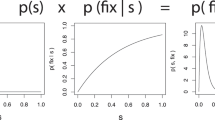Abstract
We investigate a model of language evolution, based on population game dynamics with learning. First, we examine the case of two genetic variants of universal grammar (UG), the heart of the human language faculty, assuming each admits two possible grammars. The dynamics are driven by a communication game. We prove using dynamical systems techniques that if the payoff matrix obeys certain constraints, then the two UGs are stable against invasion by each other, that is, they are evolutionarily stable. Then, we prove a similar theorem for an arbitrary number of disjoint UGs. In both theorems, the constraints are independent of the learning process. Intuitively, if a mutation in UG results in grammars that are incompatible with the established languages, then the mutation will die out because mutants will be unable to communicate and therefore unable to realize any potential benefit of the mutation. An example for which these theorems do not apply shows that compatible mutations may or may not be able to invade, depending on the population's history and the learning process. These results suggest that the genetic history of language is constrained by the need for compatibility and that mutations in the language faculty may have died out or taken over due more to historical accident than to any straightforward notion of relative fitness.
Similar content being viewed by others
References
Adger, D., 2003. Core Syntax: A Minimalist Approach. Oxford University Press, Oxford.
Briscoe, E.J., 2000. Grammatical acquisition: Inductive bias and coevolution of language and the language acquisition device. Language 76(2), 245–296.
Cangelosi, A., Parisi, D., editors, 2002. Simulating the evolution of language. Springer-Verlag.
Chomsky, N., 1988. Language and problems of knowledge. MIT Press.
Guckenheimer, J., Holmes, P., 1990. Nonlinear oscillations, dynamical systems, and bifurcations of vector fields. Springer-Verlag.
Hauser, M.D., 1996. The evolution of communication. Harvard University Press, Cambridge, MA.
Hofbauer, J., Sigmund, K., 1998. Evolutionary games and population dynamics. Cambridge University Press.
Hurford, J.R., Studdert-Kennedy, M., Knight, C., editors, 1998. Approaches to the evolution of language. Cambridge University Press.
Jackendoff, R., 1999. Possible stages in the evolution of the language capacity. Trends Cogn. Sci. 3, 272–279.
Jackendoff, R., 2002. Foundations of language. Oxford University Press, Oxford.
Kirby, S., 2001. Spontaneous evolution of linguistic structure: an iterated learning model of the emergence of regularity and irregularity. IEEE Trans. Evol. Comput. 5(2), 102–110.
Komarova, N.L., Nowak, M.A., 2001a. The evolutionary dynamics of the lexical matrix. Bull. Math. Biol. 63(3), 451–485.
Komarova, N.L., Nowak, M.A., 2001b. Natural selection of the critical period for language acquisition. Proc. Royal Soc. London, Ser. B 268, 1189–1196.
Komarova, N.L., Niyogi, P., Nowak, M.A., 2001. The evolutionary dynamics of grammar acquisition. J. Theor. Biol. 209(1), 43–59.
Lai, C.S.L., Fisher, S.E., Hurst, J.A., Vargha-Khadem, F., Monaco, A.P., 2001. A forkhead-domain gene is mutated in a severe speech and language disorder. Nature 413(6855), 519–523.
Lightfoot, D., 1999. The development of language: Acquisition, Changes and Evolution. Blackwell Publishers.
Mitchener, W.G., 2003a. Bifurcation analysis of the fully symmetric language dynamical equation. J. Math. Biol. 46, 265–285.
Mitchener, W.G., 2003b. A mathematical model of human languages: The interaction of game dynamics and learning processes. PhD thesis, Princeton University.
Mitchener, W.G., Nowak, M.A., 2003. Competitive exclusion and coexistence of universal grammars. Bull. Math. Biol. 65(1), 67–93.
Mitchener, W.G., Nowak, M.A., 2004. Chaos and language. Proc. Royal Soc. London, Biol. Sci. 271(1540), 701–704, DOI 10.1098/rspb.2003.2643.
Niyogi, P., Berwick, R.C., 1997a. Evolutionary consequences of language learning. Linguist. Philos. 20, 697–719.
Niyogi, P., Berwick, R.C., 1997b. A dynamical systems model for language change. Complex Syst. 11, 161–204. URL ftp://publications.ai.mit.edu/ai-publications/1500-1999/AIM-1515.ps.Z.
Nowak, M.A., Krakauer, D.C., 1999. The evolution of language. Proc. Natl. Acad. Sci. U. S. A. 96, 8028–8033.
Nowak, M.A., Krakauer, D.C., Dress, A., 1999a. An error limit for the evolution of language. Proc. Royal Soc. London, Ser. B. 266, 2131–2136.
Nowak, M.A., Plotkin, J., Krakauer, D.C., 1999b. The evolutionary language game. J. Theor. Biol. 200, 147–162.
Nowak, M.A., Plotkin, J., Jansen, V.A.A., 2000. Evolution of syntactic communication. Nature 404(6777), 495–498.
Nowak, M.A., Komarova, N.L., Niyogi, P., 2001. Evolution of universal grammar. Science 291(5501), 114–118.
Nowak, M.A., Komarova, N.L., Niyogi, P., 2002. Computational and evolutionary aspects of language. Nature 417(6889), 611–617.
Pinker, S., 1990. The Language Instinct. W. Morrow and Company, New York.
Pinker, S., Bloom, P., 1990. Natural language and natural selection. Behav. Brain Sci. 13, 707–784.
Plotkin, J., Nowak, M.A., 2000. Language evolution and information theory. J. Theor. Biol. 205, 147–159.
Radford, A., 2004. Minimalist Syntax: Exploring the Structure of English. Cambridge University Press, Cambridge.
Tesar, B., Smolensky, P., 2000. Learnability in Optimality Theory. MIT Press.
Trapa, P.E., Nowak, M.A., 2000. Nash equilibria for an evolutionary language game. J. Math. Biol. 41, 172–188.
Author information
Authors and Affiliations
Corresponding author
Additional information
MSC 1991: 37N25 · 92D15 · 91F20
Rights and permissions
About this article
Cite this article
Mitchener, W.G. Game Dynamics with Learning and Evolution of Universal Grammar. Bull. Math. Biol. 69, 1093–1118 (2007). https://doi.org/10.1007/s11538-006-9165-x
Received:
Accepted:
Published:
Issue Date:
DOI: https://doi.org/10.1007/s11538-006-9165-x




